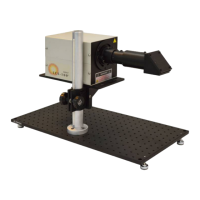M94011A
Oriel
®
LCS-100
TM
Small Area Sol1A
- 7 -
4. Attach a cover plate over the output port of any illuminator that will be used without the output
enclosed, before operation.
2.3 OZONE
Shortwave ultraviolet radiation photolyses oxygen to produce ozone - O
3
. Relatively low
concentrations of ozone can cause nasal dryness and a burning sensation in the throat, headaches,
nausea, and irritation of the mucous membranes.
A 150 W UV arc lamp can contribute more than 1 part ozone per million to the cooling air system.
This may be of little consequence in a well-ventilated area, but some people are very sensitive to
ozone and long term effects are not well documented. Noticeable symptoms for most people appear at
around 0.3 - 0.5 ppm.
Recommended maximum exposures are typically:
0.1 ppm for 8 hours exposure
2 ppm or a 2 hour exposure
Recommendations
1. Use an ozone free lamp unless you need the shortwave UV.
2. Vent the cooling air stream to atmosphere (with a low resistance vent path). Do not vent ozone
into a small, enclosed room.
3. Use an Oriel Ozone Eater
TM
.
2.4 ELECTRICAL SHOCK
When the 94011A(-ES) is operated as intended, the interlock system and the package design
eliminate risk of electrical shock.
Be aware that a high transitory voltage is used to ignite the lamp and, before ignition, the lamp
terminals have a potential difference of up to 200 V. This voltage is dangerous. If there is any concern
about the interlock system, great care is required.
Recommendations
1. Disconnect the illuminator from the ac power mains before removing the cover or optics
assembly.
2. Keep personnel clear of all exposed terminals.
3. Make sure all connections are securely made and check the polarity before starting a lamp.
4. Do not handle lamp leads during lamp ignition.

